Essay on Leadership: AL, LMX, PsyCap, and Employee Performance
VerifiedAdded on 2022/09/09
|9
|2425
|18
Essay
AI Summary
This essay delves into the intricate relationships between authentic leadership (AL), Leader-Member Exchange (LMX), and employees' Psychological Capital (PsyCap). It explores how authentic leaders foster high-quality LMX, which in turn positively impacts subordinates' authenticity and performance. The essay further examines methods for cultivating PsyCap among various employee groups, highlighting the influence of organizational environment and individual attributes. Additionally, it discusses how emotions of leaders and managers significantly affect employee performance, including job satisfaction, team spirit, and overall productivity, drawing on various research studies. The study also examines the role of cross-cultural training in enhancing PsyCap and the impact of stressors on employee behavior. The essay concludes by emphasizing the importance of authentic leadership and LMX in fostering trust, mutual respect, and ultimately, improved employee outcomes.

Running head: MANAGEMENT
MANAGEMENT
Name of the Student:
Name of the University:
Author note:
MANAGEMENT
Name of the Student:
Name of the University:
Author note:
Paraphrase This Document
Need a fresh take? Get an instant paraphrase of this document with our AI Paraphraser
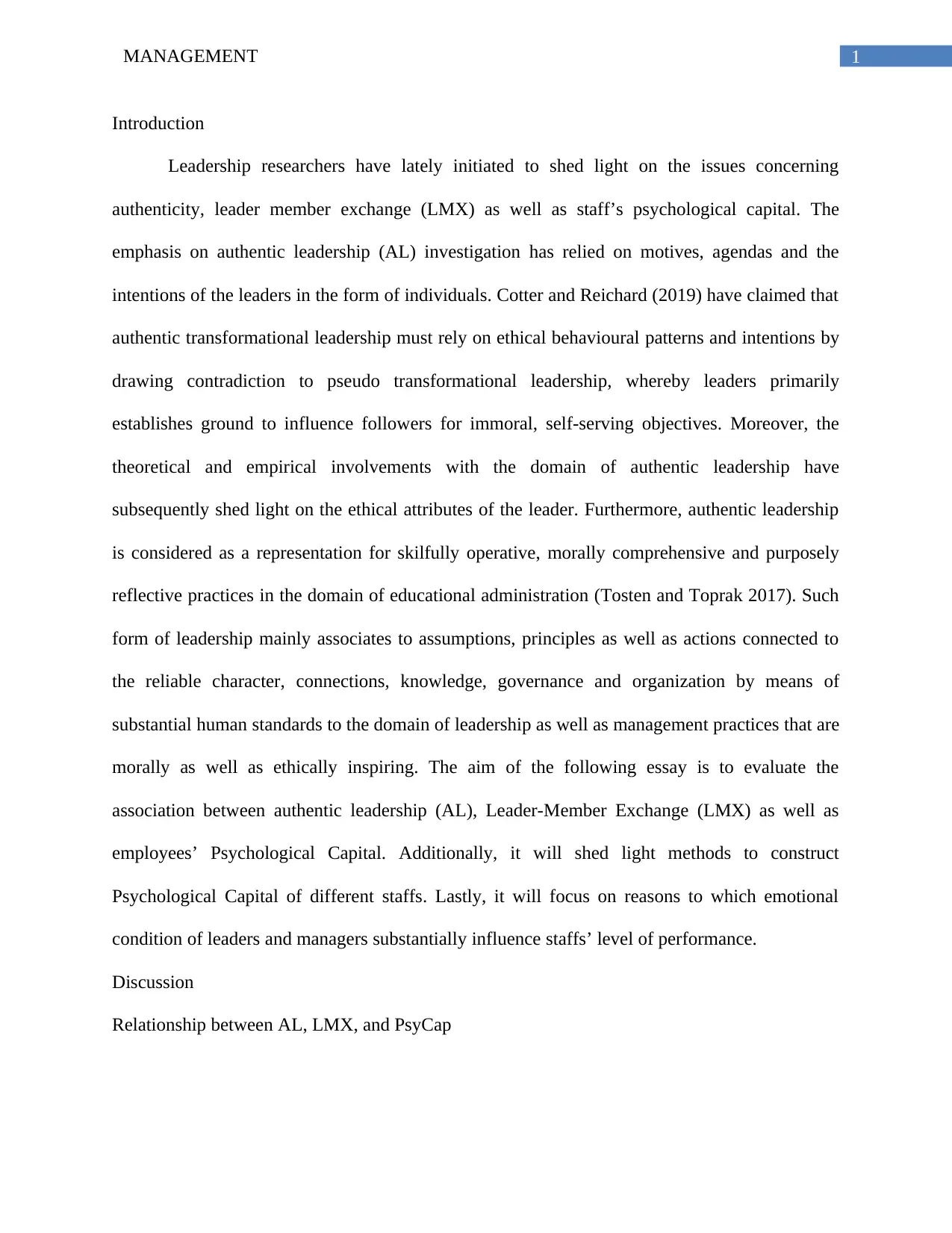
1MANAGEMENT
Introduction
Leadership researchers have lately initiated to shed light on the issues concerning
authenticity, leader member exchange (LMX) as well as staff’s psychological capital. The
emphasis on authentic leadership (AL) investigation has relied on motives, agendas and the
intentions of the leaders in the form of individuals. Cotter and Reichard (2019) have claimed that
authentic transformational leadership must rely on ethical behavioural patterns and intentions by
drawing contradiction to pseudo transformational leadership, whereby leaders primarily
establishes ground to influence followers for immoral, self-serving objectives. Moreover, the
theoretical and empirical involvements with the domain of authentic leadership have
subsequently shed light on the ethical attributes of the leader. Furthermore, authentic leadership
is considered as a representation for skilfully operative, morally comprehensive and purposely
reflective practices in the domain of educational administration (Tosten and Toprak 2017). Such
form of leadership mainly associates to assumptions, principles as well as actions connected to
the reliable character, connections, knowledge, governance and organization by means of
substantial human standards to the domain of leadership as well as management practices that are
morally as well as ethically inspiring. The aim of the following essay is to evaluate the
association between authentic leadership (AL), Leader-Member Exchange (LMX) as well as
employees’ Psychological Capital. Additionally, it will shed light methods to construct
Psychological Capital of different staffs. Lastly, it will focus on reasons to which emotional
condition of leaders and managers substantially influence staffs’ level of performance.
Discussion
Relationship between AL, LMX, and PsyCap
Introduction
Leadership researchers have lately initiated to shed light on the issues concerning
authenticity, leader member exchange (LMX) as well as staff’s psychological capital. The
emphasis on authentic leadership (AL) investigation has relied on motives, agendas and the
intentions of the leaders in the form of individuals. Cotter and Reichard (2019) have claimed that
authentic transformational leadership must rely on ethical behavioural patterns and intentions by
drawing contradiction to pseudo transformational leadership, whereby leaders primarily
establishes ground to influence followers for immoral, self-serving objectives. Moreover, the
theoretical and empirical involvements with the domain of authentic leadership have
subsequently shed light on the ethical attributes of the leader. Furthermore, authentic leadership
is considered as a representation for skilfully operative, morally comprehensive and purposely
reflective practices in the domain of educational administration (Tosten and Toprak 2017). Such
form of leadership mainly associates to assumptions, principles as well as actions connected to
the reliable character, connections, knowledge, governance and organization by means of
substantial human standards to the domain of leadership as well as management practices that are
morally as well as ethically inspiring. The aim of the following essay is to evaluate the
association between authentic leadership (AL), Leader-Member Exchange (LMX) as well as
employees’ Psychological Capital. Additionally, it will shed light methods to construct
Psychological Capital of different staffs. Lastly, it will focus on reasons to which emotional
condition of leaders and managers substantially influence staffs’ level of performance.
Discussion
Relationship between AL, LMX, and PsyCap
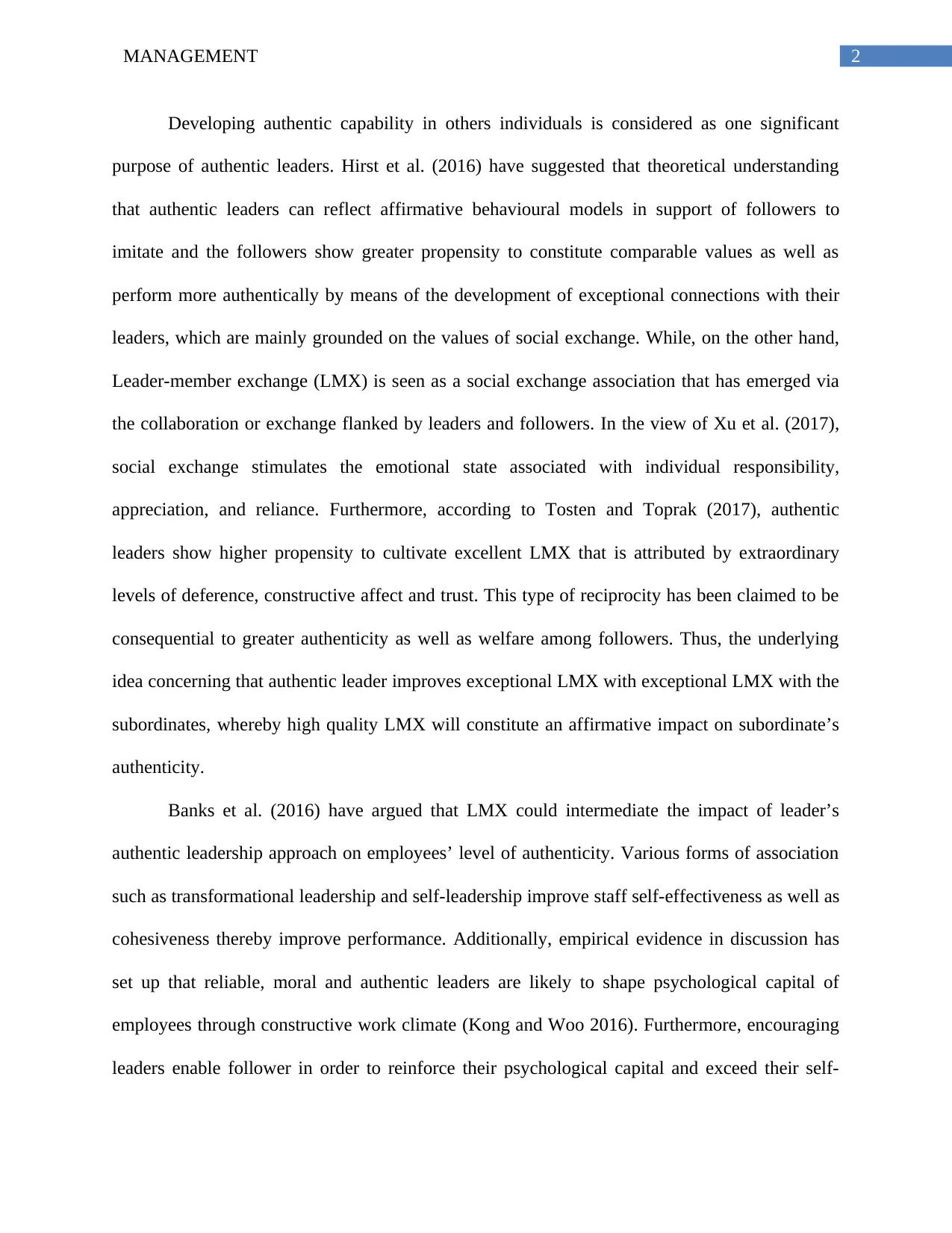
2MANAGEMENT
Developing authentic capability in others individuals is considered as one significant
purpose of authentic leaders. Hirst et al. (2016) have suggested that theoretical understanding
that authentic leaders can reflect affirmative behavioural models in support of followers to
imitate and the followers show greater propensity to constitute comparable values as well as
perform more authentically by means of the development of exceptional connections with their
leaders, which are mainly grounded on the values of social exchange. While, on the other hand,
Leader-member exchange (LMX) is seen as a social exchange association that has emerged via
the collaboration or exchange flanked by leaders and followers. In the view of Xu et al. (2017),
social exchange stimulates the emotional state associated with individual responsibility,
appreciation, and reliance. Furthermore, according to Tosten and Toprak (2017), authentic
leaders show higher propensity to cultivate excellent LMX that is attributed by extraordinary
levels of deference, constructive affect and trust. This type of reciprocity has been claimed to be
consequential to greater authenticity as well as welfare among followers. Thus, the underlying
idea concerning that authentic leader improves exceptional LMX with exceptional LMX with the
subordinates, whereby high quality LMX will constitute an affirmative impact on subordinate’s
authenticity.
Banks et al. (2016) have argued that LMX could intermediate the impact of leader’s
authentic leadership approach on employees’ level of authenticity. Various forms of association
such as transformational leadership and self-leadership improve staff self-effectiveness as well as
cohesiveness thereby improve performance. Additionally, empirical evidence in discussion has
set up that reliable, moral and authentic leaders are likely to shape psychological capital of
employees through constructive work climate (Kong and Woo 2016). Furthermore, encouraging
leaders enable follower in order to reinforce their psychological capital and exceed their self-
Developing authentic capability in others individuals is considered as one significant
purpose of authentic leaders. Hirst et al. (2016) have suggested that theoretical understanding
that authentic leaders can reflect affirmative behavioural models in support of followers to
imitate and the followers show greater propensity to constitute comparable values as well as
perform more authentically by means of the development of exceptional connections with their
leaders, which are mainly grounded on the values of social exchange. While, on the other hand,
Leader-member exchange (LMX) is seen as a social exchange association that has emerged via
the collaboration or exchange flanked by leaders and followers. In the view of Xu et al. (2017),
social exchange stimulates the emotional state associated with individual responsibility,
appreciation, and reliance. Furthermore, according to Tosten and Toprak (2017), authentic
leaders show higher propensity to cultivate excellent LMX that is attributed by extraordinary
levels of deference, constructive affect and trust. This type of reciprocity has been claimed to be
consequential to greater authenticity as well as welfare among followers. Thus, the underlying
idea concerning that authentic leader improves exceptional LMX with exceptional LMX with the
subordinates, whereby high quality LMX will constitute an affirmative impact on subordinate’s
authenticity.
Banks et al. (2016) have argued that LMX could intermediate the impact of leader’s
authentic leadership approach on employees’ level of authenticity. Various forms of association
such as transformational leadership and self-leadership improve staff self-effectiveness as well as
cohesiveness thereby improve performance. Additionally, empirical evidence in discussion has
set up that reliable, moral and authentic leaders are likely to shape psychological capital of
employees through constructive work climate (Kong and Woo 2016). Furthermore, encouraging
leaders enable follower in order to reinforce their psychological capital and exceed their self-
⊘ This is a preview!⊘
Do you want full access?
Subscribe today to unlock all pages.

Trusted by 1+ million students worldwide
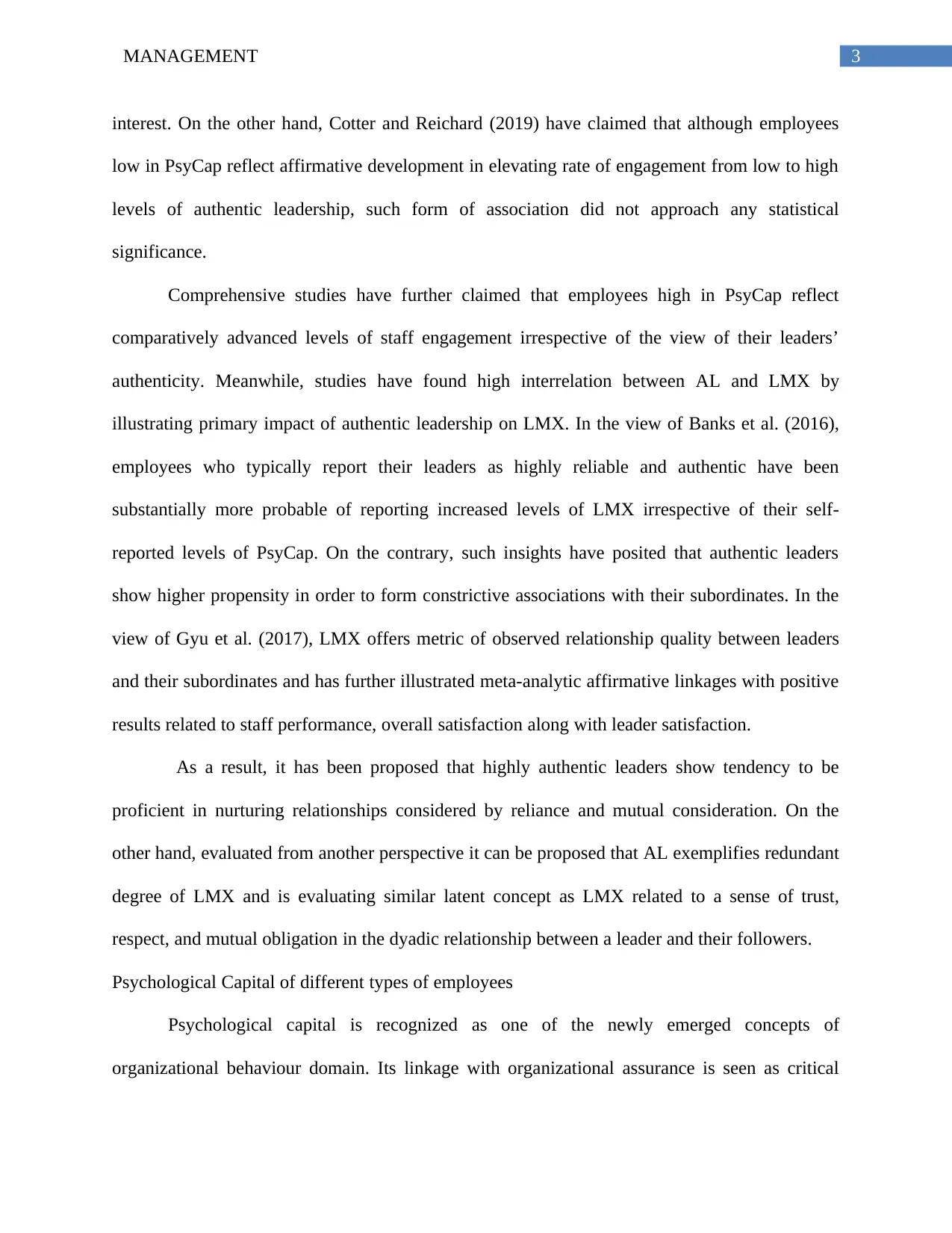
3MANAGEMENT
interest. On the other hand, Cotter and Reichard (2019) have claimed that although employees
low in PsyCap reflect affirmative development in elevating rate of engagement from low to high
levels of authentic leadership, such form of association did not approach any statistical
significance.
Comprehensive studies have further claimed that employees high in PsyCap reflect
comparatively advanced levels of staff engagement irrespective of the view of their leaders’
authenticity. Meanwhile, studies have found high interrelation between AL and LMX by
illustrating primary impact of authentic leadership on LMX. In the view of Banks et al. (2016),
employees who typically report their leaders as highly reliable and authentic have been
substantially more probable of reporting increased levels of LMX irrespective of their self-
reported levels of PsyCap. On the contrary, such insights have posited that authentic leaders
show higher propensity in order to form constrictive associations with their subordinates. In the
view of Gyu et al. (2017), LMX offers metric of observed relationship quality between leaders
and their subordinates and has further illustrated meta-analytic affirmative linkages with positive
results related to staff performance, overall satisfaction along with leader satisfaction.
As a result, it has been proposed that highly authentic leaders show tendency to be
proficient in nurturing relationships considered by reliance and mutual consideration. On the
other hand, evaluated from another perspective it can be proposed that AL exemplifies redundant
degree of LMX and is evaluating similar latent concept as LMX related to a sense of trust,
respect, and mutual obligation in the dyadic relationship between a leader and their followers.
Psychological Capital of different types of employees
Psychological capital is recognized as one of the newly emerged concepts of
organizational behaviour domain. Its linkage with organizational assurance is seen as critical
interest. On the other hand, Cotter and Reichard (2019) have claimed that although employees
low in PsyCap reflect affirmative development in elevating rate of engagement from low to high
levels of authentic leadership, such form of association did not approach any statistical
significance.
Comprehensive studies have further claimed that employees high in PsyCap reflect
comparatively advanced levels of staff engagement irrespective of the view of their leaders’
authenticity. Meanwhile, studies have found high interrelation between AL and LMX by
illustrating primary impact of authentic leadership on LMX. In the view of Banks et al. (2016),
employees who typically report their leaders as highly reliable and authentic have been
substantially more probable of reporting increased levels of LMX irrespective of their self-
reported levels of PsyCap. On the contrary, such insights have posited that authentic leaders
show higher propensity in order to form constrictive associations with their subordinates. In the
view of Gyu et al. (2017), LMX offers metric of observed relationship quality between leaders
and their subordinates and has further illustrated meta-analytic affirmative linkages with positive
results related to staff performance, overall satisfaction along with leader satisfaction.
As a result, it has been proposed that highly authentic leaders show tendency to be
proficient in nurturing relationships considered by reliance and mutual consideration. On the
other hand, evaluated from another perspective it can be proposed that AL exemplifies redundant
degree of LMX and is evaluating similar latent concept as LMX related to a sense of trust,
respect, and mutual obligation in the dyadic relationship between a leader and their followers.
Psychological Capital of different types of employees
Psychological capital is recognized as one of the newly emerged concepts of
organizational behaviour domain. Its linkage with organizational assurance is seen as critical
Paraphrase This Document
Need a fresh take? Get an instant paraphrase of this document with our AI Paraphraser
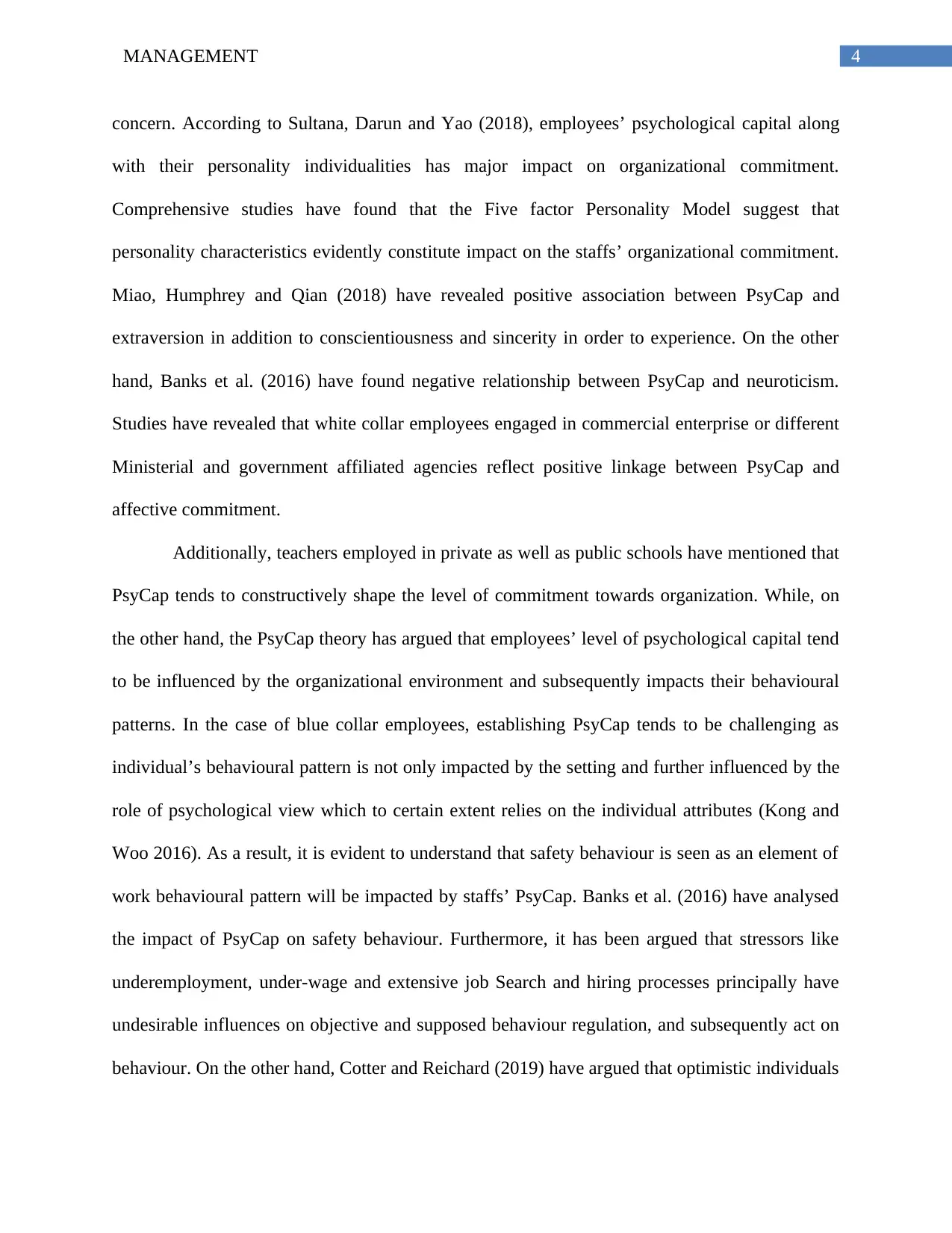
4MANAGEMENT
concern. According to Sultana, Darun and Yao (2018), employees’ psychological capital along
with their personality individualities has major impact on organizational commitment.
Comprehensive studies have found that the Five factor Personality Model suggest that
personality characteristics evidently constitute impact on the staffs’ organizational commitment.
Miao, Humphrey and Qian (2018) have revealed positive association between PsyCap and
extraversion in addition to conscientiousness and sincerity in order to experience. On the other
hand, Banks et al. (2016) have found negative relationship between PsyCap and neuroticism.
Studies have revealed that white collar employees engaged in commercial enterprise or different
Ministerial and government affiliated agencies reflect positive linkage between PsyCap and
affective commitment.
Additionally, teachers employed in private as well as public schools have mentioned that
PsyCap tends to constructively shape the level of commitment towards organization. While, on
the other hand, the PsyCap theory has argued that employees’ level of psychological capital tend
to be influenced by the organizational environment and subsequently impacts their behavioural
patterns. In the case of blue collar employees, establishing PsyCap tends to be challenging as
individual’s behavioural pattern is not only impacted by the setting and further influenced by the
role of psychological view which to certain extent relies on the individual attributes (Kong and
Woo 2016). As a result, it is evident to understand that safety behaviour is seen as an element of
work behavioural pattern will be impacted by staffs’ PsyCap. Banks et al. (2016) have analysed
the impact of PsyCap on safety behaviour. Furthermore, it has been argued that stressors like
underemployment, under-wage and extensive job Search and hiring processes principally have
undesirable influences on objective and supposed behaviour regulation, and subsequently act on
behaviour. On the other hand, Cotter and Reichard (2019) have argued that optimistic individuals
concern. According to Sultana, Darun and Yao (2018), employees’ psychological capital along
with their personality individualities has major impact on organizational commitment.
Comprehensive studies have found that the Five factor Personality Model suggest that
personality characteristics evidently constitute impact on the staffs’ organizational commitment.
Miao, Humphrey and Qian (2018) have revealed positive association between PsyCap and
extraversion in addition to conscientiousness and sincerity in order to experience. On the other
hand, Banks et al. (2016) have found negative relationship between PsyCap and neuroticism.
Studies have revealed that white collar employees engaged in commercial enterprise or different
Ministerial and government affiliated agencies reflect positive linkage between PsyCap and
affective commitment.
Additionally, teachers employed in private as well as public schools have mentioned that
PsyCap tends to constructively shape the level of commitment towards organization. While, on
the other hand, the PsyCap theory has argued that employees’ level of psychological capital tend
to be influenced by the organizational environment and subsequently impacts their behavioural
patterns. In the case of blue collar employees, establishing PsyCap tends to be challenging as
individual’s behavioural pattern is not only impacted by the setting and further influenced by the
role of psychological view which to certain extent relies on the individual attributes (Kong and
Woo 2016). As a result, it is evident to understand that safety behaviour is seen as an element of
work behavioural pattern will be impacted by staffs’ PsyCap. Banks et al. (2016) have analysed
the impact of PsyCap on safety behaviour. Furthermore, it has been argued that stressors like
underemployment, under-wage and extensive job Search and hiring processes principally have
undesirable influences on objective and supposed behaviour regulation, and subsequently act on
behaviour. On the other hand, Cotter and Reichard (2019) have argued that optimistic individuals
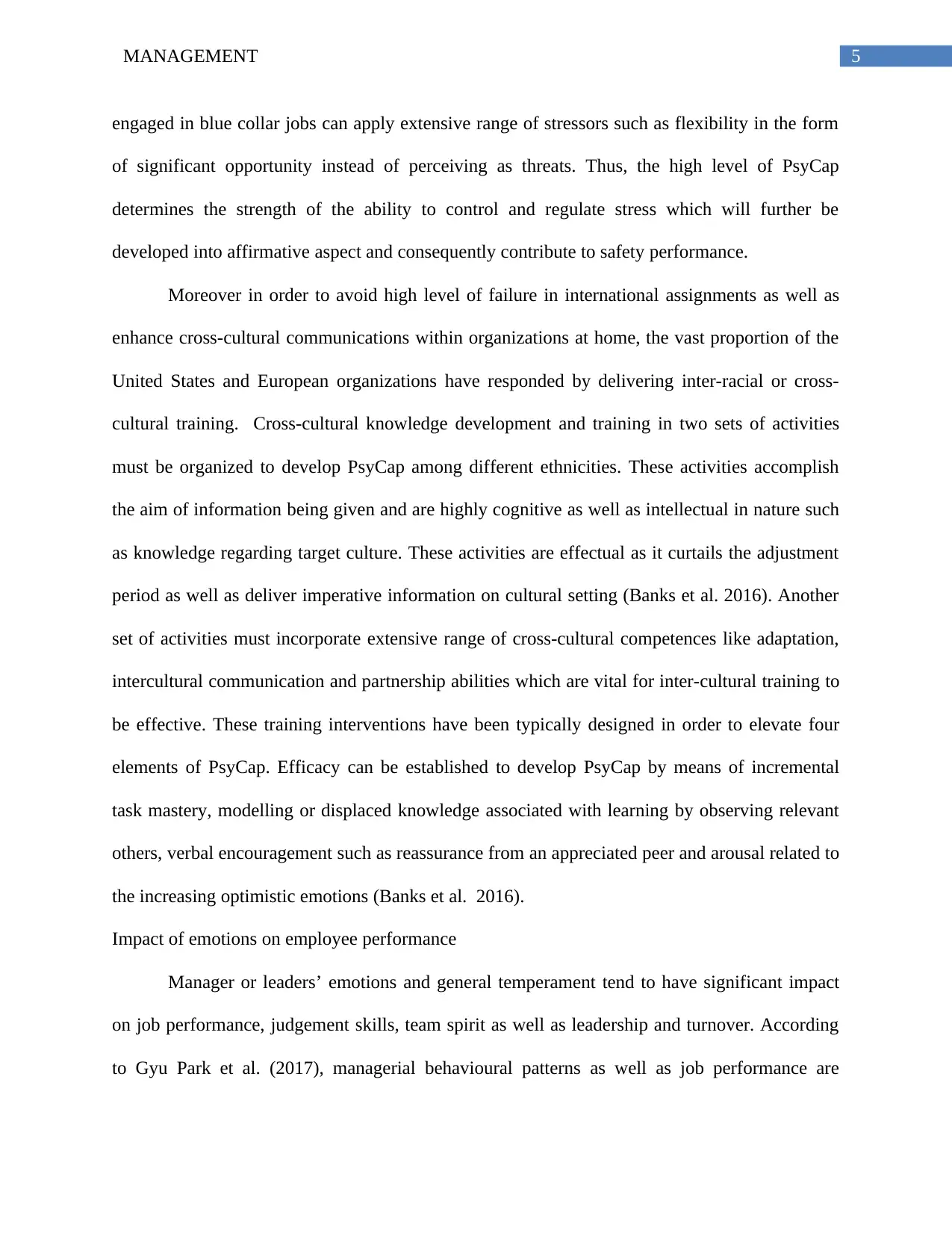
5MANAGEMENT
engaged in blue collar jobs can apply extensive range of stressors such as flexibility in the form
of significant opportunity instead of perceiving as threats. Thus, the high level of PsyCap
determines the strength of the ability to control and regulate stress which will further be
developed into affirmative aspect and consequently contribute to safety performance.
Moreover in order to avoid high level of failure in international assignments as well as
enhance cross-cultural communications within organizations at home, the vast proportion of the
United States and European organizations have responded by delivering inter-racial or cross-
cultural training. Cross-cultural knowledge development and training in two sets of activities
must be organized to develop PsyCap among different ethnicities. These activities accomplish
the aim of information being given and are highly cognitive as well as intellectual in nature such
as knowledge regarding target culture. These activities are effectual as it curtails the adjustment
period as well as deliver imperative information on cultural setting (Banks et al. 2016). Another
set of activities must incorporate extensive range of cross-cultural competences like adaptation,
intercultural communication and partnership abilities which are vital for inter-cultural training to
be effective. These training interventions have been typically designed in order to elevate four
elements of PsyCap. Efficacy can be established to develop PsyCap by means of incremental
task mastery, modelling or displaced knowledge associated with learning by observing relevant
others, verbal encouragement such as reassurance from an appreciated peer and arousal related to
the increasing optimistic emotions (Banks et al. 2016).
Impact of emotions on employee performance
Manager or leaders’ emotions and general temperament tend to have significant impact
on job performance, judgement skills, team spirit as well as leadership and turnover. According
to Gyu Park et al. (2017), managerial behavioural patterns as well as job performance are
engaged in blue collar jobs can apply extensive range of stressors such as flexibility in the form
of significant opportunity instead of perceiving as threats. Thus, the high level of PsyCap
determines the strength of the ability to control and regulate stress which will further be
developed into affirmative aspect and consequently contribute to safety performance.
Moreover in order to avoid high level of failure in international assignments as well as
enhance cross-cultural communications within organizations at home, the vast proportion of the
United States and European organizations have responded by delivering inter-racial or cross-
cultural training. Cross-cultural knowledge development and training in two sets of activities
must be organized to develop PsyCap among different ethnicities. These activities accomplish
the aim of information being given and are highly cognitive as well as intellectual in nature such
as knowledge regarding target culture. These activities are effectual as it curtails the adjustment
period as well as deliver imperative information on cultural setting (Banks et al. 2016). Another
set of activities must incorporate extensive range of cross-cultural competences like adaptation,
intercultural communication and partnership abilities which are vital for inter-cultural training to
be effective. These training interventions have been typically designed in order to elevate four
elements of PsyCap. Efficacy can be established to develop PsyCap by means of incremental
task mastery, modelling or displaced knowledge associated with learning by observing relevant
others, verbal encouragement such as reassurance from an appreciated peer and arousal related to
the increasing optimistic emotions (Banks et al. 2016).
Impact of emotions on employee performance
Manager or leaders’ emotions and general temperament tend to have significant impact
on job performance, judgement skills, team spirit as well as leadership and turnover. According
to Gyu Park et al. (2017), managerial behavioural patterns as well as job performance are
⊘ This is a preview!⊘
Do you want full access?
Subscribe today to unlock all pages.

Trusted by 1+ million students worldwide
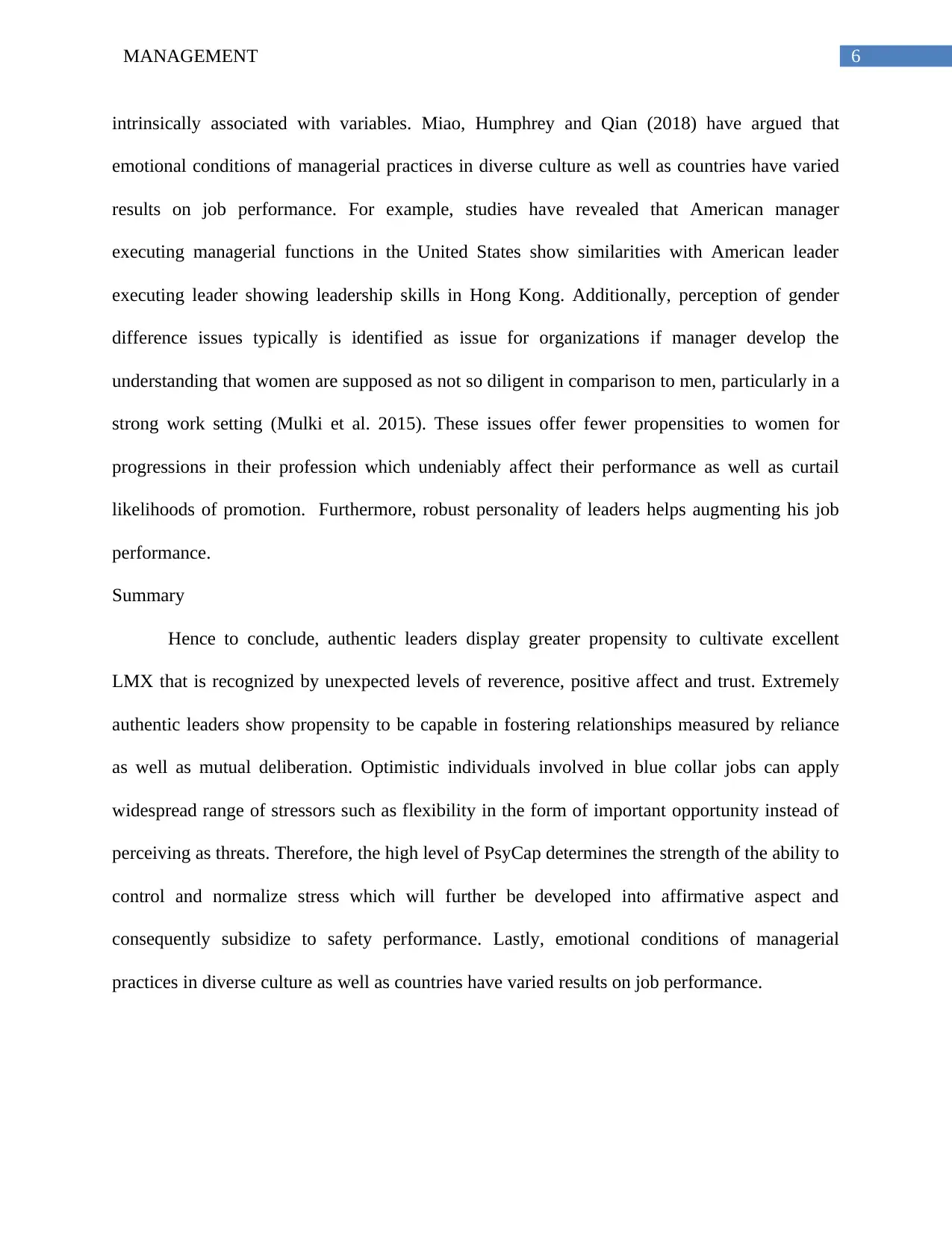
6MANAGEMENT
intrinsically associated with variables. Miao, Humphrey and Qian (2018) have argued that
emotional conditions of managerial practices in diverse culture as well as countries have varied
results on job performance. For example, studies have revealed that American manager
executing managerial functions in the United States show similarities with American leader
executing leader showing leadership skills in Hong Kong. Additionally, perception of gender
difference issues typically is identified as issue for organizations if manager develop the
understanding that women are supposed as not so diligent in comparison to men, particularly in a
strong work setting (Mulki et al. 2015). These issues offer fewer propensities to women for
progressions in their profession which undeniably affect their performance as well as curtail
likelihoods of promotion. Furthermore, robust personality of leaders helps augmenting his job
performance.
Summary
Hence to conclude, authentic leaders display greater propensity to cultivate excellent
LMX that is recognized by unexpected levels of reverence, positive affect and trust. Extremely
authentic leaders show propensity to be capable in fostering relationships measured by reliance
as well as mutual deliberation. Optimistic individuals involved in blue collar jobs can apply
widespread range of stressors such as flexibility in the form of important opportunity instead of
perceiving as threats. Therefore, the high level of PsyCap determines the strength of the ability to
control and normalize stress which will further be developed into affirmative aspect and
consequently subsidize to safety performance. Lastly, emotional conditions of managerial
practices in diverse culture as well as countries have varied results on job performance.
intrinsically associated with variables. Miao, Humphrey and Qian (2018) have argued that
emotional conditions of managerial practices in diverse culture as well as countries have varied
results on job performance. For example, studies have revealed that American manager
executing managerial functions in the United States show similarities with American leader
executing leader showing leadership skills in Hong Kong. Additionally, perception of gender
difference issues typically is identified as issue for organizations if manager develop the
understanding that women are supposed as not so diligent in comparison to men, particularly in a
strong work setting (Mulki et al. 2015). These issues offer fewer propensities to women for
progressions in their profession which undeniably affect their performance as well as curtail
likelihoods of promotion. Furthermore, robust personality of leaders helps augmenting his job
performance.
Summary
Hence to conclude, authentic leaders display greater propensity to cultivate excellent
LMX that is recognized by unexpected levels of reverence, positive affect and trust. Extremely
authentic leaders show propensity to be capable in fostering relationships measured by reliance
as well as mutual deliberation. Optimistic individuals involved in blue collar jobs can apply
widespread range of stressors such as flexibility in the form of important opportunity instead of
perceiving as threats. Therefore, the high level of PsyCap determines the strength of the ability to
control and normalize stress which will further be developed into affirmative aspect and
consequently subsidize to safety performance. Lastly, emotional conditions of managerial
practices in diverse culture as well as countries have varied results on job performance.
Paraphrase This Document
Need a fresh take? Get an instant paraphrase of this document with our AI Paraphraser
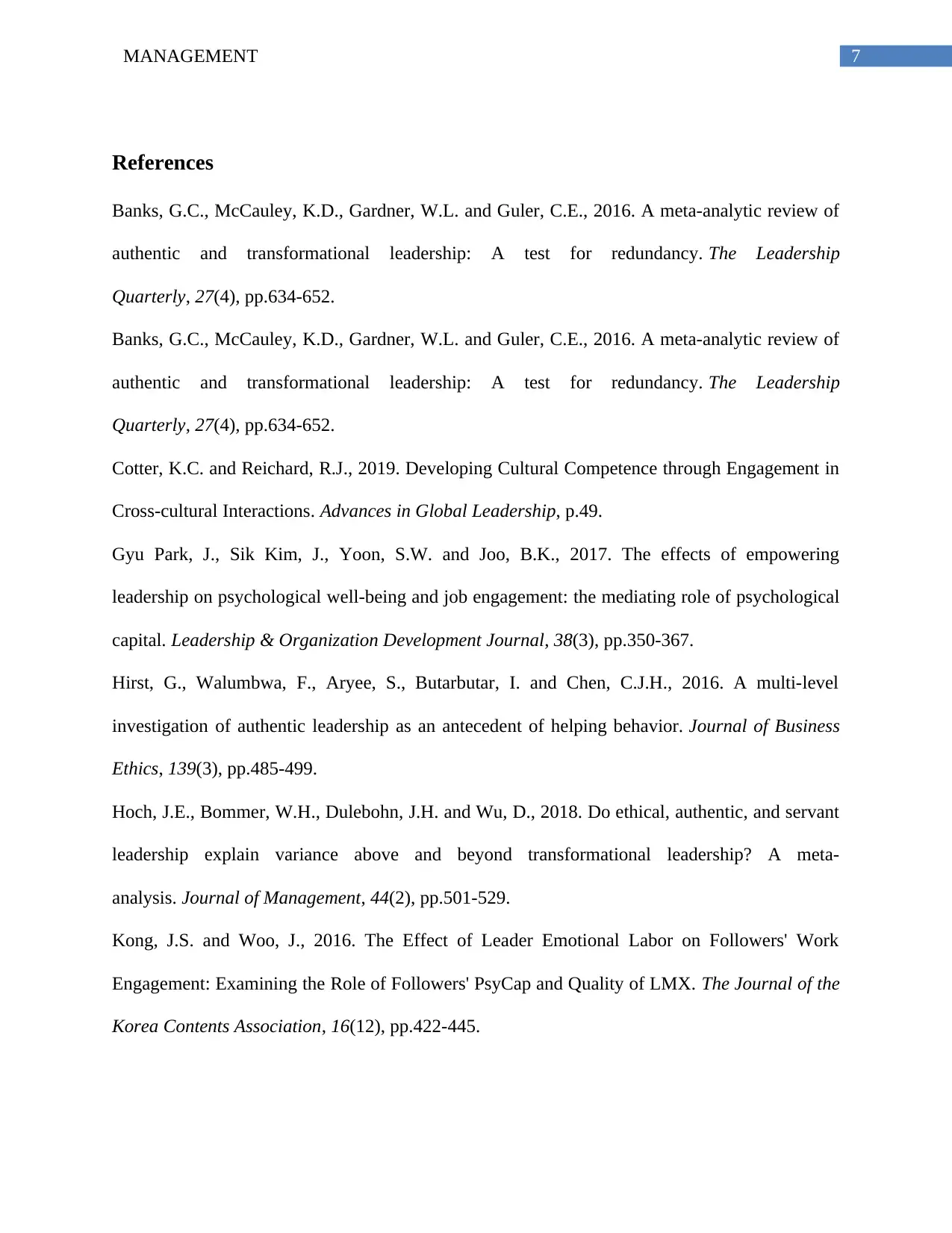
7MANAGEMENT
References
Banks, G.C., McCauley, K.D., Gardner, W.L. and Guler, C.E., 2016. A meta-analytic review of
authentic and transformational leadership: A test for redundancy. The Leadership
Quarterly, 27(4), pp.634-652.
Banks, G.C., McCauley, K.D., Gardner, W.L. and Guler, C.E., 2016. A meta-analytic review of
authentic and transformational leadership: A test for redundancy. The Leadership
Quarterly, 27(4), pp.634-652.
Cotter, K.C. and Reichard, R.J., 2019. Developing Cultural Competence through Engagement in
Cross-cultural Interactions. Advances in Global Leadership, p.49.
Gyu Park, J., Sik Kim, J., Yoon, S.W. and Joo, B.K., 2017. The effects of empowering
leadership on psychological well-being and job engagement: the mediating role of psychological
capital. Leadership & Organization Development Journal, 38(3), pp.350-367.
Hirst, G., Walumbwa, F., Aryee, S., Butarbutar, I. and Chen, C.J.H., 2016. A multi-level
investigation of authentic leadership as an antecedent of helping behavior. Journal of Business
Ethics, 139(3), pp.485-499.
Hoch, J.E., Bommer, W.H., Dulebohn, J.H. and Wu, D., 2018. Do ethical, authentic, and servant
leadership explain variance above and beyond transformational leadership? A meta-
analysis. Journal of Management, 44(2), pp.501-529.
Kong, J.S. and Woo, J., 2016. The Effect of Leader Emotional Labor on Followers' Work
Engagement: Examining the Role of Followers' PsyCap and Quality of LMX. The Journal of the
Korea Contents Association, 16(12), pp.422-445.
References
Banks, G.C., McCauley, K.D., Gardner, W.L. and Guler, C.E., 2016. A meta-analytic review of
authentic and transformational leadership: A test for redundancy. The Leadership
Quarterly, 27(4), pp.634-652.
Banks, G.C., McCauley, K.D., Gardner, W.L. and Guler, C.E., 2016. A meta-analytic review of
authentic and transformational leadership: A test for redundancy. The Leadership
Quarterly, 27(4), pp.634-652.
Cotter, K.C. and Reichard, R.J., 2019. Developing Cultural Competence through Engagement in
Cross-cultural Interactions. Advances in Global Leadership, p.49.
Gyu Park, J., Sik Kim, J., Yoon, S.W. and Joo, B.K., 2017. The effects of empowering
leadership on psychological well-being and job engagement: the mediating role of psychological
capital. Leadership & Organization Development Journal, 38(3), pp.350-367.
Hirst, G., Walumbwa, F., Aryee, S., Butarbutar, I. and Chen, C.J.H., 2016. A multi-level
investigation of authentic leadership as an antecedent of helping behavior. Journal of Business
Ethics, 139(3), pp.485-499.
Hoch, J.E., Bommer, W.H., Dulebohn, J.H. and Wu, D., 2018. Do ethical, authentic, and servant
leadership explain variance above and beyond transformational leadership? A meta-
analysis. Journal of Management, 44(2), pp.501-529.
Kong, J.S. and Woo, J., 2016. The Effect of Leader Emotional Labor on Followers' Work
Engagement: Examining the Role of Followers' PsyCap and Quality of LMX. The Journal of the
Korea Contents Association, 16(12), pp.422-445.
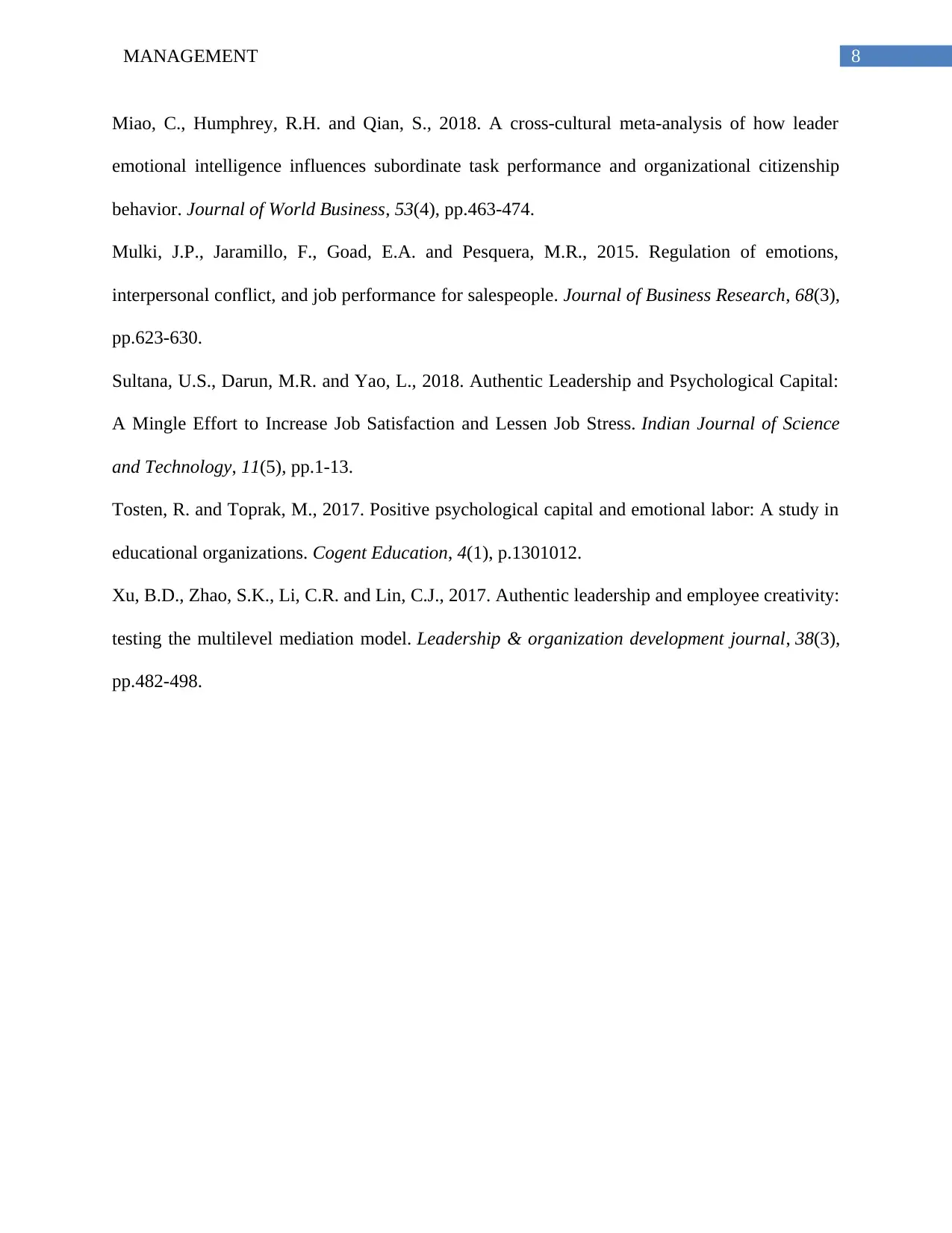
8MANAGEMENT
Miao, C., Humphrey, R.H. and Qian, S., 2018. A cross-cultural meta-analysis of how leader
emotional intelligence influences subordinate task performance and organizational citizenship
behavior. Journal of World Business, 53(4), pp.463-474.
Mulki, J.P., Jaramillo, F., Goad, E.A. and Pesquera, M.R., 2015. Regulation of emotions,
interpersonal conflict, and job performance for salespeople. Journal of Business Research, 68(3),
pp.623-630.
Sultana, U.S., Darun, M.R. and Yao, L., 2018. Authentic Leadership and Psychological Capital:
A Mingle Effort to Increase Job Satisfaction and Lessen Job Stress. Indian Journal of Science
and Technology, 11(5), pp.1-13.
Tosten, R. and Toprak, M., 2017. Positive psychological capital and emotional labor: A study in
educational organizations. Cogent Education, 4(1), p.1301012.
Xu, B.D., Zhao, S.K., Li, C.R. and Lin, C.J., 2017. Authentic leadership and employee creativity:
testing the multilevel mediation model. Leadership & organization development journal, 38(3),
pp.482-498.
Miao, C., Humphrey, R.H. and Qian, S., 2018. A cross-cultural meta-analysis of how leader
emotional intelligence influences subordinate task performance and organizational citizenship
behavior. Journal of World Business, 53(4), pp.463-474.
Mulki, J.P., Jaramillo, F., Goad, E.A. and Pesquera, M.R., 2015. Regulation of emotions,
interpersonal conflict, and job performance for salespeople. Journal of Business Research, 68(3),
pp.623-630.
Sultana, U.S., Darun, M.R. and Yao, L., 2018. Authentic Leadership and Psychological Capital:
A Mingle Effort to Increase Job Satisfaction and Lessen Job Stress. Indian Journal of Science
and Technology, 11(5), pp.1-13.
Tosten, R. and Toprak, M., 2017. Positive psychological capital and emotional labor: A study in
educational organizations. Cogent Education, 4(1), p.1301012.
Xu, B.D., Zhao, S.K., Li, C.R. and Lin, C.J., 2017. Authentic leadership and employee creativity:
testing the multilevel mediation model. Leadership & organization development journal, 38(3),
pp.482-498.
⊘ This is a preview!⊘
Do you want full access?
Subscribe today to unlock all pages.

Trusted by 1+ million students worldwide
1 out of 9
Related Documents
Your All-in-One AI-Powered Toolkit for Academic Success.
+13062052269
info@desklib.com
Available 24*7 on WhatsApp / Email
![[object Object]](/_next/static/media/star-bottom.7253800d.svg)
Unlock your academic potential
Copyright © 2020–2025 A2Z Services. All Rights Reserved. Developed and managed by ZUCOL.




